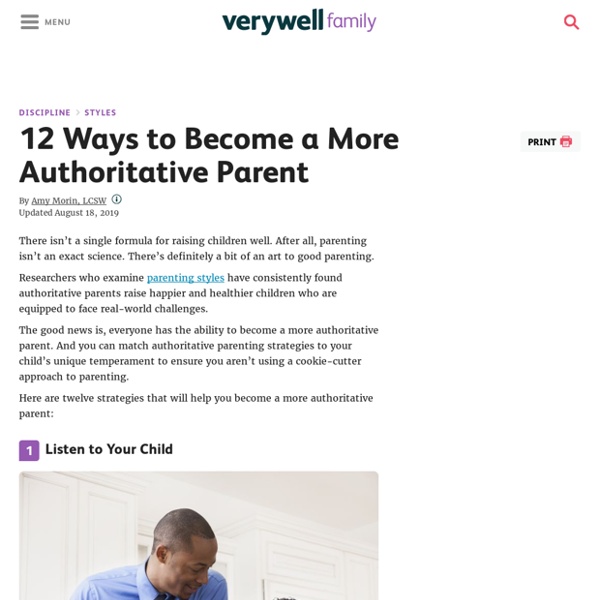4 Types of Parenting Styles and Their Effects on Kids
Your parenting style can affect everything from how much your child weighs to how she feels about herself. It's important to ensure your parenting style is supporting healthy growth and development because the way you interact with your child and how you discipline her will influence her for the rest of her life. Researchers have identified four types of parenting styles:1 AuthoritarianAuthoritativePermissiveUninvolved
Characteristics and Effects of Uninvolved Parenting
Uninvolved parenting, sometimes referred to as neglectful parenting, is a style characterized by a lack of responsiveness to a child's needs. Uninvolved parents make few to no demands of their children and they are often indifferent, dismissive, or even completely neglectful. The Major Parenting Styles During the 1960s, psychologist Diana Baumrind described three different parenting styles based on her research with preschool-age children: authoritarian, authoritative, and permissive parenting. In later years, researchers added a fourth style known as uninvolved parenting. So what does the uninvolved parenting style look like at a glance?
What Is Permissive Parenting?
Permissive parenting is a type of parenting style characterized by low demands with high responsiveness. Permissive parents tend to be very loving, yet provide few guidelines and rules. These parents do not expect mature behavior from their children and often seem more like a friend than a parental figure. These parents tend to be the polar opposite of the so-called "helicopter parents."
VIDEO 2: Difference between permissive and authoritarian parenting
Transcription: So there are two pretty typical parenting styles parents use. The first is permissive, and this is generally described as freedom without order. The parent will oftentimes give into the child to avoid a temper tantrum, a pushback, or a meltdown.
The Best Parenting Style for Effective Relationship-Building with Your Children – Part II - RPM3 From The National Institute Of Child Health And Human Development
Gary Gilles is a Licensed Clinical Professional Counselor in private practice for over 20 years. He is also an adjunct faculty member at the University...Read More In part one, we discussed three very common parenting styles: authoritarian, permissive and authoritative. Although there are helpful aspects to each of the styles, the preferred style is authoritative. Parents who use an authoritative approach must exert more energy to guide and teach than permissive parents, and less control than authoritarian parents. The authoritarian style recognizes that children function best when they know what is expected of them.
Permissive Parenting: The Pros and Cons
You may think there’s only one type of parenting. But according to parenting theorists, there are actually several different styles of parenting. One theorist came up with eight different styles of parenting, and of those, there are three that are most common in today’s modern-parenting: authoritative, authoritarian, and permissive.
The Definition of Authoritarian Parenting
Authoritarian parenting is a parenting style characterized by high demands and low responsiveness. Parents with an authoritarian style have very high expectations of their children, yet provide very little in the way of feedback and nurturing. Mistakes tend to be punished harshly. When feedback does occur, it is often negative. Yelling and corporal punishment are also common in the authoritarian style.
Permissive parenting: A guide for the science-minded parent
© 2010-19 Gwen Dewar, Ph.D., all rights reserved Permissive parenting seems to be the "no discipline" approach to discipline. Does it damage kids? Threaten to destroy civilization?
Authoritarian parenting: What happens to the kids?
Photo by CEphoto, Uwe Aranas © 2010-2017 Gwen Dewar, Ph.D., all rights reserved The authoritarian parenting style is about being strict and stern. It insists on unquestioning obedience, and enforces good behavior through threats, shaming, and other punishments. As defined by psychologists, it's also a style associated with less parental warmth and responsiveness (Baumrind 1991). That doesn't bode well for a child's health outcomes, especially if she's growing up in an otherwise stressful environment.
What’s the ‘best’ parenting style to raise a successful child?
Since kids don’t come with an instruction manual, we are all just forced to figure it out as we go along. So it’s likely that the way you parent is influenced by the way you were parented, and probably complicated by the way your partner (if you have one) chooses to parent. There are several parenting styles that most experts agree on, and each one affects our children differently. While some reports favor specific parenting styles over others, Marsha Ferrick, Ph.D., BCC, licensed clinical psychologist says there really isn’t a best parenting style. “Success lies in the parent-child fit that looks at how the characteristics of the parents and the child are able to work together.
The Long-Term Impact of Neglectful Parents
Source: JPagetRFPhotos/Shutterstock If you were emotionally or physically neglected as a child, it can be a difficult journey to healing. Neglect can be a hard thing to put your finger on, especially emotional neglect. Neglected children often don’t realize they are being neglected at the time, and can internalize the pain and loneliness and think it is their fault. They are often told they are “too sensitive” or “selfish” if they try to get their needs met.
Authoritative Parenting Definition, Characteristics, Examples and More!
Authoritative parenting is a style of raising children that involves thoughtful and intentional nurturing. The parent disciplines using compassion, respect and understanding. Mental and emotional well-being is always the goal of the authoritative parent.
Permissive Parenting: Its Characteristics And Effect On Children
Image: Shutterstock Daniel’s parents were highly affectionate to him. He was allowed to sleep late and wake up whenever he wanted. He was allowed to play loud music even if it disturbed the neighbors. He had his way almost all the time.



